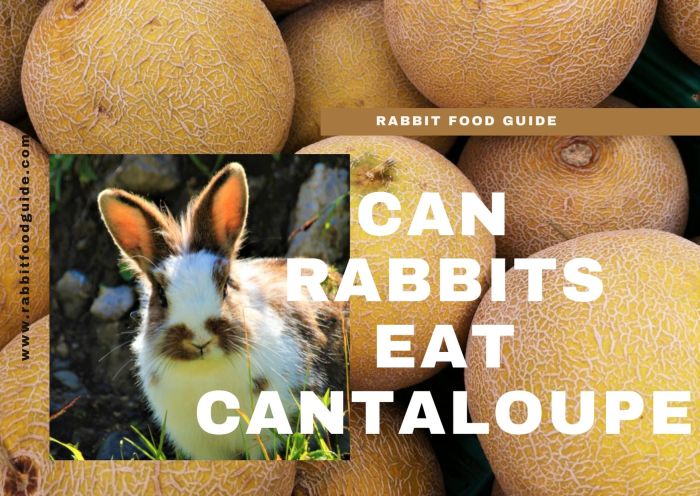Cantaloupe, a sweet and juicy summer fruit, is a popular choice for humans. But can rabbits enjoy this refreshing treat as well? The answer is yes, rabbits can have cantaloupe in moderation as part of a balanced diet. In this article, we’ll delve into the nutritional value, serving guidelines, potential health risks, preparation tips, and storage methods of cantaloupe for rabbits.
Rabbits are herbivores with a unique digestive system, so it’s crucial to understand the specific dietary needs of these furry friends. Cantaloupe, with its rich nutrient profile, can provide several health benefits for rabbits when consumed responsibly.
Nutritional Value of Cantaloupe for Rabbits
Cantaloupe offers a range of essential nutrients that can benefit rabbit health. It is a rich source of vitamins, including vitamins A, C, and K, as well as minerals like potassium and manganese. Additionally, cantaloupe contains a significant amount of fiber, which is crucial for a rabbit’s digestive system.
Benefits of Cantaloupe for Rabbit Health
The nutritional value of cantaloupe makes it a potentially beneficial treat for rabbits. Vitamin A supports eye and skin health, while vitamin C boosts the immune system and helps prevent scurvy. Vitamin K aids in blood clotting, and potassium supports heart and kidney function.
The fiber in cantaloupe promotes a healthy digestive system and prevents gastrointestinal issues like diarrhea and constipation.
Serving Size and Frequency
Determining the appropriate serving size and frequency of cantaloupe for rabbits is crucial to ensure their health and well-being.
As a general rule, rabbits can safely consume a small piece of cantaloupe, approximately the size of a golf ball, once or twice a week. This serving size provides them with essential nutrients without overwhelming their digestive system.
Incorporating Cantaloupe into a Balanced Diet
To ensure a balanced diet for your rabbit, incorporate cantaloupe as a occasional treat, not as a staple food. Offer it alongside a variety of fresh vegetables, such as leafy greens, carrots, and celery, to provide a comprehensive range of nutrients.
Potential Health Risks
Feeding cantaloupe to rabbits in excess can lead to digestive upset, such as diarrhea or gas. The high sugar content of cantaloupe can also contribute to weight gain and dental problems if consumed regularly.
Introducing Cantaloupe Gradually
To minimize potential health risks, introduce cantaloupe to your rabbit’s diet gradually. Start with a small piece and monitor your rabbit for any adverse reactions, such as digestive upset or allergic reactions. If your rabbit shows any signs of discomfort, discontinue feeding cantaloupe and consult with your veterinarian.
Preparation and Storage
To ensure the safety and enjoyment of cantaloupe for your rabbits, proper preparation and storage are crucial.
Begin by thoroughly washing the cantaloupe under running water to remove any dirt or pesticides. Cut the cantaloupe in half and remove the seeds using a spoon or your fingers. Cut the flesh into bite-sized pieces, approximately 1-2 cm in size, to prevent choking hazards.
Storage
To maintain the freshness and nutritional value of cantaloupe, store it properly in the refrigerator. Place the cut cantaloupe in an airtight container or wrap it tightly in plastic wrap to prevent moisture loss and contamination. Properly stored cantaloupe can last for 3-5 days in the refrigerator.
Alternatives to Cantaloupe

While cantaloupe is a healthy treat for rabbits, there are other fruits that can also provide essential nutrients and vitamins.
Apples
Apples are a good source of fiber, vitamin C, and potassium. They are also low in calories and sugar, making them a healthy choice for rabbits. However, apples should be fed in moderation, as they can cause gas and diarrhea if eaten in large quantities.
Bananas
Bananas are a good source of potassium, vitamin C, and fiber. They are also a good source of energy, making them a good choice for active rabbits. However, bananas are high in sugar, so they should be fed in moderation.
Berries
Berries are a good source of antioxidants, vitamins, and minerals. They are also low in calories and sugar, making them a healthy choice for rabbits. Some good choices for rabbits include blueberries, strawberries, and raspberries.
Outcome Summary
Incorporating cantaloupe into your rabbit’s diet can be a rewarding experience, offering a tasty and nutritious treat. Remember to follow the serving guidelines, introduce cantaloupe gradually, and monitor your rabbit for any adverse reactions. By understanding the potential benefits and risks associated with feeding cantaloupe to rabbits, you can ensure a healthy and balanced diet for your beloved companion.
FAQ Section
How often can rabbits eat cantaloupe?
Rabbits can safely eat cantaloupe 2-3 times per week as part of a balanced diet.
Can rabbits eat cantaloupe seeds?
No, cantaloupe seeds are not suitable for rabbits and should be removed before serving.
What are some alternative fruits for rabbits?
Suitable alternatives to cantaloupe for rabbits include apples, bananas, and berries, which offer a range of nutrients.